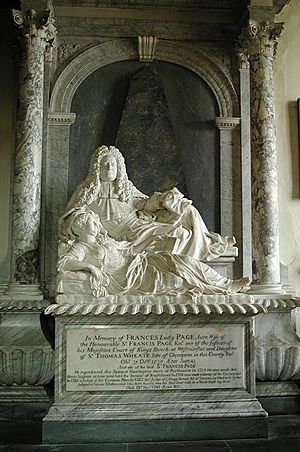Francis Page (judge) facts for kids
Sir Francis Page (1661 – 19 December 1741) was an important English judge and politician. He served in the House of Commons, which is part of the British Parliament, from 1708 to 1713. He later became a well-known judge.
Contents
Early Life and Legal Training
Francis Page was born in 1661. His father, Nicholas Page, was a vicar in Bloxham, Oxfordshire. A vicar is a type of priest in the Church of England.
In 1685, Francis Page began his legal studies. He joined the Inner Temple, which is one of the four Inns of Court in London. These Inns are professional associations for barristers in England and Wales.
He became a barrister in 1690. This meant he was qualified to argue cases in court. In 1704, he became a "Serjeant-at-law." This was a very senior rank for a barrister at that time.
Family Life
Francis Page married Isabella White in 1690. She was from Greenwich, Kent. Later, in 1705, he married Frances Wheate. She was the daughter of Sir Thomas Wheate, a well-known figure.
Political Career
Sir Francis Page also had a career in politics. He was involved with the estates of the 3rd Earl of Sandwich. This connection helped him gain influence in the area of Huntingdon.
In 1708, he was elected as a Member of Parliament (MP) for Huntingdon. An MP represents a specific area in the House of Commons. He was considered a member of the Whig political group.
He served as an MP until 1713. In that year, he stepped down from his position. He did this to allow Lord Hinchingbrooke to become the MP for Huntingdon. Lord Hinchingbrooke had just become old enough to serve in Parliament.
A Judge's Journey
After his time in Parliament, Sir Francis Page's legal career really took off. In 1713, he became a "bencher." This is a senior member of an Inn of Court.
His career continued to grow under the new Hanoverian kings. In 1715, he became the King's Serjeant. This was another important legal role. He also helped try people involved in a rebellion in Lancashire in 1715–1716.
Rising Through the Courts
Sir Francis Page received several promotions in the legal system:
- In 1718, he became a Baron of the Exchequer. This was a judge in a court that dealt with royal finances and other legal matters.
- In 1726, he was promoted to Justice of the Court of Common Pleas. This court handled legal disputes between ordinary people.
- In 1727, he became a Justice of the King's Bench. This was one of the most important courts in England. It dealt with serious criminal cases and other major legal issues.
When he became a Justice of the King's Bench, he was also knighted. This meant he was given the title "Sir."
The "Hanging Judge"
Sir Francis Page earned a reputation for being very strict and tough in court. Some people called him "the hanging judge." This nickname came from his severe judgments.
He was even criticized by famous writers and artists of his time. These included Alexander Pope, Henry Fielding, William Hogarth, and Samuel Johnson. The poet Richard Savage also wrote about him. Sir Francis Page had presided over Savage's trial for murder.
Richard Savage wrote a poem that described Page as someone who wasn't very learned. He suggested that Page's judgments could confuse juries. The poem implied that other judges might have been embarrassed by his actions.
Later Life and Legacy
Sir Francis Page passed away on December 19, 1741, at the age of 80. He did not have any children.
He was buried in a family mausoleum in Steeple Aston. A mausoleum is a large building that serves as a tomb. This one was built on the ruins of an old chapel next to the church.
The famous sculptor Henry Scheemakers created a grand monument for Page's tomb. This monument was built exactly as Page had wanted. It was so large that it replaced some older tombs when it was put in place.
Most of his property was left to his great-nephew, Francis Bourne. This included a house in London and a manor in Lechlade, Gloucestershire. Francis Bourne had to change his name to Page to inherit the estate.
 | William L. Dawson |
 | W. E. B. Du Bois |
 | Harry Belafonte |


